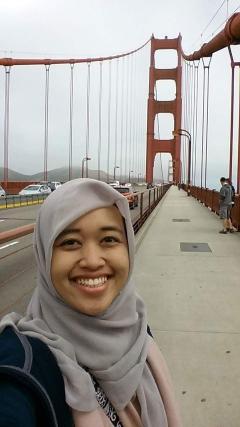Marifatul Amalia, MSc Education (Research - ESRC)
'The most useful thing I learned is to always challenge my own assumptions and be critical towards something that we usually take for granted in life. While this seems to be ‘obvious’, the lectures, workshops, and tutorial sessions here are designed so that students have to step back and think critically about the issues before formulating an argument.'

What were you doing before you studied at the University of Edinburgh?
I was a Research Manager at the research institution in Jakarta, Indonesia. I worked there for four years.
Why did you choose to study at the University of Edinburgh?
The University of Edinburgh, in general, is one of the best universities in the UK and in the world. And Moray House School of Education and Sport, is also well-acknowledged for their top programme in Education, where there are several distinguished professors that fits my interests in inequality in education.
Why did you choose to study this degree?
I am interested in education issues and how we can make education policy better for people. I wanted to get more knowledge about education itself, then to apply the knowledge to the current pressing issues, such as inequality.
What did you enjoy most about the programme?
The courses, the professors, and the cohorts. The courses are well-designed such that it begins with answering a question about “What is education for?” then it ends with contemporary issues in education, such as inequalities, ethics, and digital transformation. These all are reflected in the available optional courses.
The professors are well-acknowledged in their field. And the cohort, I could not be more grateful to know people from everywhere around the world and learn about different cultures, and different thoughts, during my programme.
What specific skills did you develop?
This programme helped me to develop my critical thinking and academic writing through assignments, presentations and class discussion (or debate). Additionally, as an ESRC-funded student, I had an opportunity to take some compulsory courses in other schools (the School of Social and Political Science). From here, I developed additional research methods from courses that I took, such as quantitative analysis, research design, and finally, MSc dissertation.
What was the most useful thing you learned in your lectures, workshops and tutorials?
The most useful thing I learned is to always challenge my own assumptions and be critical towards something that we usually take for granted in life. While this seems to be ‘obvious’, the lectures, workshops, and tutorial sessions here are designed so that students have to step back and think critically about the issues before formulating an argument.
Why would you recommend the programme to others?
MSc Education programme fits people with any previous educational and cultural background. The programme also covers wide topic areas in education. So, please check the available course options and see where your interests land!
In what way do you think the degree will contribute to your career?
I want to continue to a PhD programme and hopefully, work as a university professor with interests in inequalities and education policy. The courses in this programme helped me with a basic foundation in education topics and tools to conduct research in education, which will be useful to develop my research framework in the future.
What advice would you give to someone considering studying this programme at Edinburgh?
It will be good to have an initial idea of your interests. This will be helpful to choose elective courses, plan your assignments, and more importantly, your MSc dissertation. Having an initial research ideas or interests will help to make the most out of the year of your Master’s programme.
What is your current role or occupation?
I am starting a PhD programme at Moray House School of Education and Sport, University of Edinburgh in October 2022. My research topic is inequality in Science, Technology, Engineering, and Math (STEM) education, where I will explore gender inequality and inequality across socioeconomic status in STEM.
How did your experience at Edinburgh help you get where you are today?
As I mentioned previously, the courses in this programme helped me with basic foundation in education theory and current issues in education, including inequality, curriculum, assessment, and education policy around the world.
What advice would you have for someone looking to work in your industry?
Having some research ideas at the beginning of the master’s programme is useful so that you can align your essays, MSc dissertation, PhD proposal, and hopefully, your PhD thesis around the same topic. This way, you will work more efficiently in terms of literature review, choosing courses, and building your research methods. Also, please keep in touch with your lecturers, tutors, and staffs. They can help to brainstorm your research ideas and they may recommend you to their colleagues that will help you with your research.

